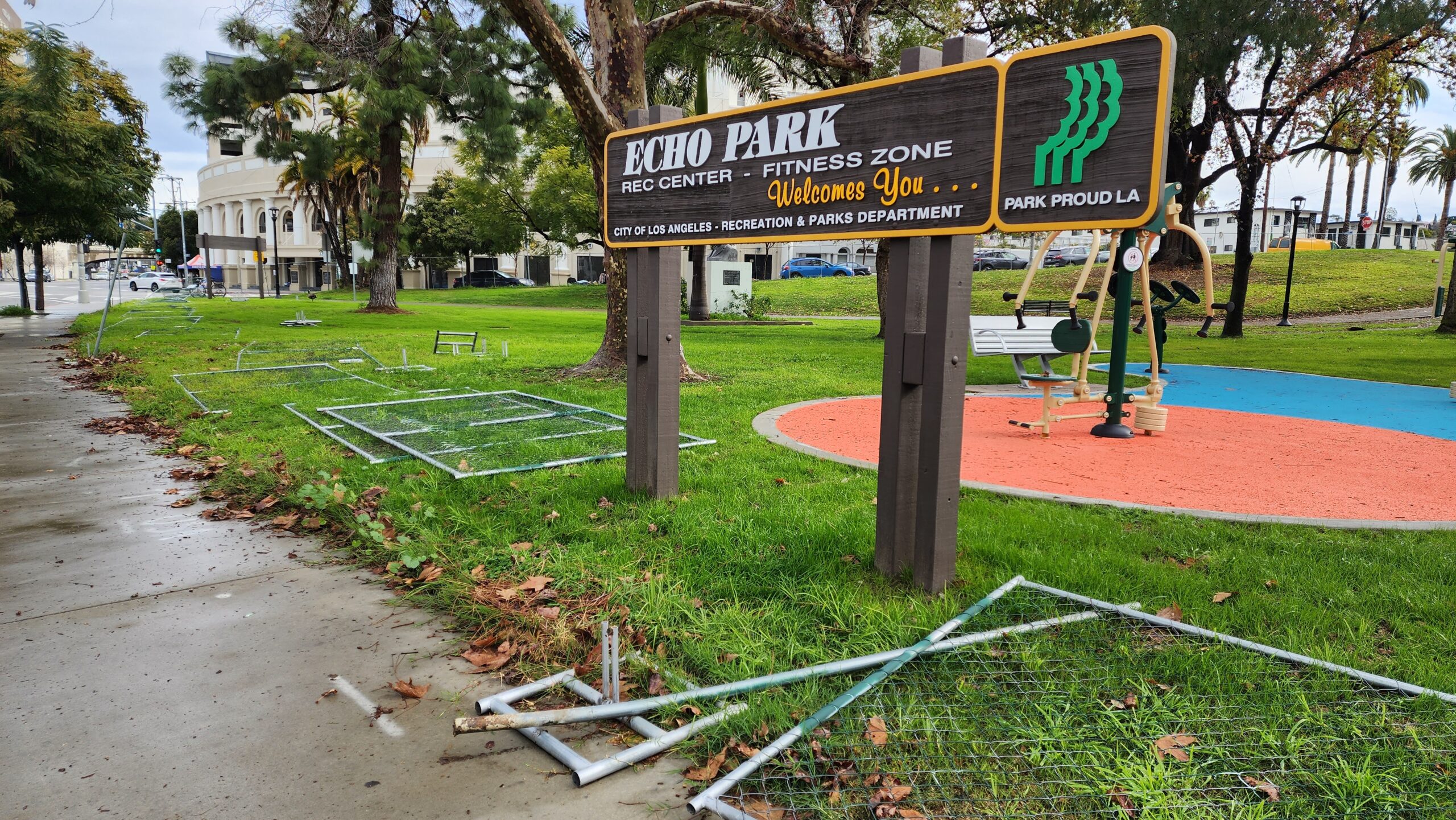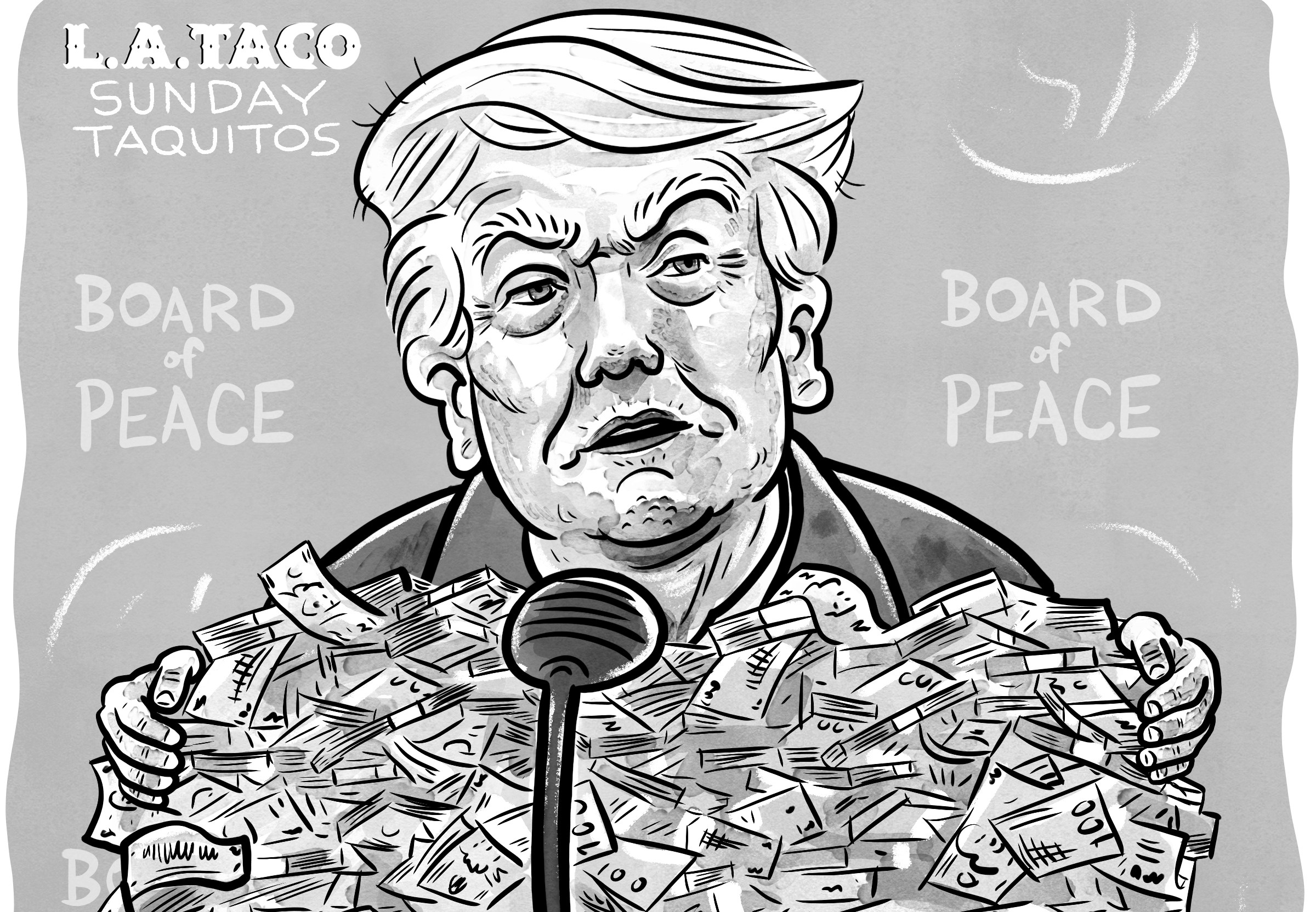Two weeks ago, activists took down a small section of the fence surrounding Echo Park Lake on the northwest side of the park, reigniting calls on social media for the entire fence to be removed.
Three days later, Councilmember Hugo Soto-Martinez, the city council representative for Echo Park, released a statement confirming that they were planning to “take down the fence” without offering a specific date.
These two events brought the fence, which has surrounded Echo Park Lake and divided local residents for nearly two years, back into the spotlight.
On the campaign trail in 2022, Soto-Martinez had promised he would take down the fence. However, two months after being sworn into office in December, the fence remains up.
"Leaving [the fence] up is a slap in the face to the people who were harmed by the city when it was installed,” tweeted Albert Corado earlier this month. The activist ran against Soto-Martinez last year .
It appears that some of the fencing surrounding Echo Park Lake (on the northwest side of the park), was recently knocked down. pic.twitter.com/yt5DfdCuPx
— Lexis-Olivier Ray (@ShotOn35mm) January 30, 2023
In an interview with L.A. TACO at the Council District 13 Echo Park field office on Sunset Boulevard, Soto-Martinez denied that recent activist demands pushed him to make an announcement about the fence.
"To say that [activists] somehow forced our hands, that's just not true,” Soto-Martinez said.
The council member firmly believes that before the park can open, a team of outreach workers and service providers needs to be prepared to help unhoused residents, should they return to the park.
“Putting up a fence is easy, because it's masking the problem,” Soto-Martinez said. “What we're trying to do is create a model that is effective, that can be used in other parts of the city.”
The former labor organizer and his staff see taking down the fence surrounding Echo Park Lake as the most notable example of the city removing anti-homeless or hostile architecture from a public space in L.A.'s entire history.
“I think most people can agree that if it fails, we're going to lose the discussion and the narrative about how we can decriminalize zones in the city," Soto-Martinez said. "That responsibility shouldn’t be taken lightly.”
Soto-Martinez’s office began meeting with service providers, activists, former residents of the park and other stakeholders in early-December, a week before Soto-Martinez's first official day in office, according to a calendar entry reviewed by L.A. TACO.
The meetings are divided into two groups: one for service providers and another for activists.
“I believe they've been having consistent weekly meetings."
An earlier draft of Soto-Martinez’s statement, reviewed by L.A. TACO, shows that his office began drafting a press release announcing that the fence would be taken down on January 19 (more than a week before activists brought down part of the fence).
According to Soto-Martinez, delays in publicly addressing the fence were partly a result of having to quickly assemble a new team around the holidays and a learning curve.
"We didn’t have a team,” Soto-Martinez said reflecting on his first weeks in office, while sitting in one of the small rooms among his growing field office.
The council member said it “took weeks” to secure a chief of staff and more than a month to secure a director of homelessness. There was also some confusion about whether or not the council office could use discretionary funds to address the fence, according to the council member.
Soto-Martinez’s team began crafting a statement in mid-January but the newly-elected council member felt that it would be premature to make an announcement before securing a homeless director for their new office. The same day news broke about part of the fence coming down, Soto-Martinez’s new homeless director came on board.
“I think activists have a role to play," Soto-Martinez said. "And if they want to have that narrative, that's cool with me. They’re not my enemy…we’re on the same side."
A date for when the fence will be removed hasn’t been confirmed yet but Soto-Martinez hopes it won’t still be standing come next month.
“We should have an update in a few weeks,” the council member said.
For nearly two years, a chain link fence erected by former L.A. City Councilmember Mitch O’Farrell, during a violent homeless sweep that attracted an estimated 400 cops, has surrounded Echo Park Lake.
A few entrances to the park remain open during the day but at night, when the park closes from 10 PM until 5 AM, all entrances to the park are fenced off.
Before the fence went up, the park was still closed at night but there was no barrier around the perimeter to keep people from walking through the park after hours or setting up a tent.
“The park was where I hung out almost every day of my life, I felt safe there,” said Queen, a 30+ year resident of Echo Park who used to live in the park.
Queen now lives in K-Town but her mother and family still live a block away from the park, in the same Jensen's Recreation Center apartment they’ve been living in since 1990.
Nearly two years ago, Queen was one of the last unhoused residents of Echo Park Lake to be evicted before it was temporarily closed. Following the eviction, she worked with a team of researchers at UCLA to better understand the impacts of displacement. The group found that few people living in Echo Park Lake found stable housing following their removal, despite promises.
Queen's says she's participated in "three or four" of the meetings organized by Soto-Martinez's office and she's happy to be apart of the process and provide feedback. But she disagrees with the council member's decision to keep the fence up. “I don't agree with it, I think the fence should come down immediately we shouldn’t have to wait for it."
“It was put up in a matter of hours…we shouldn’t have to wait for it to come down,” said Queen.
Queen cherishes her memories of Echo Park Lake before the fence went up.
She vended with her mother in the park, she raised her kids there, and she learned to walk again in the park after a life-changing leg injury.
Today, most of the street vendors that Queen grew up with have been displaced by gentrification or they sell on the other side of the fence, near the sidewalk. The community that once watched after Queen is mostly gone.
Asked if street vendors would be welcomed back into the park when the fence comes down, Soto-Martinez replied, “absolutely.”
“When we talk about having a city that's accepting and inclusive, that means [street vendors] too,” he says.
Queen believes street vendors and unhoused residents share a common bond, since they’ve both been displaced from the park. Before the fence was put up, gang injunctions and gentrification pushed many of Echo Park Lake’s street vendors and long term residents elsewhere.
“What made it Echo Park is no longer there,” she says.






